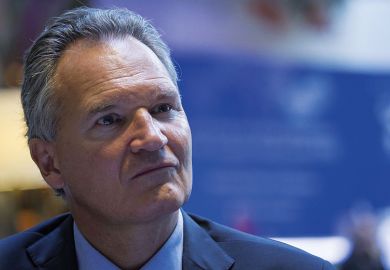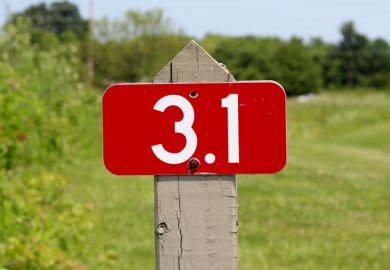Donald Trump’s chief science adviser has left the door ajar to the US introducing an open access mandate for publicly funded research, despite the country’s refusal to join the European-led Plan S initiative.
Although Kelvin Droegemeier, director of the White House Office of Science and Technology Policy, has previously said that the administration would “never” tell academics “what journals they have to publish in”, in a Times Higher Education interview he allowed for the possibility of a significant shift in open access policy.
The future of open access policy in the US has been hotly debated as Europe moves, from next January, to bar research supported by funders participating in the Plan S initiative from being kept behind paywalls, and as major universities consider following the University of California’s lead and cancelling their contracts with publishing giants such as Elsevier.
A move by major US funders towards requiring open access publication of the research they support has been seen as a key step in achieving a “big flip” away from subscription journals.
Professor Droegemeier, a University of Oklahoma meteorologist, took office as chief science adviser in February, more than halfway through Mr Trump’s term, and has responded to many questions on key issues by deferring, saying he needed more time to develop detailed positions.
He has suggested a firm philosophy on open access. “The one thing I believe this government will never do is tell researchers what journals they have to publish in,” Professor Droegemeier told a recent conference of the American Association for the Advancement of Science. “That’s totally counter to our values and totally counter to the scholarly enterprise.”
However, asked by THE why taxpayers should not be able to immediately see the published results of all the research they financed, he answered: “They maybe should – there’s all kinds of options out there being considered and discussed.”
One possible solution would be to require researchers who published in subscription journals to make their articles available via repositories, under a “green” open access model that may or may not involve an embargo period before public release.
In the interview, Professor Droegemeier rejected criticisms of Mr Trump as uninterested in science and said that he has enjoyed working with the president. Professor Droegemeier cited the administration’s work in areas that include quantum computing, ocean policy, weather forecasting and the release of the first image of a black hole.
“I don’t know how one could get the idea that the president is anti-science when you see all this stuff,” Professor Droegemeier said. “He’s a very, very smart guy himself, he asks very tough questions, and it’s fun working here.”
Professor Droegemeier has previously promised limits to the Trump administration’s escalating crackdown on foreign scholars, telling scientists that the nation must remain vigilant but “cannot forsake” its openness. However, he has conceded that the delay in confirming his appointment had limited his ability to influence policy deliberations on the matter.
POSTSCRIPT:
Print headline: US science chief: door not closed on OA mandate
Register to continue
Why register?
- Registration is free and only takes a moment
- Once registered, you can read 3 articles a month
- Sign up for our newsletter
Subscribe
Or subscribe for unlimited access to:
- Unlimited access to news, views, insights & reviews
- Digital editions
- Digital access to THE’s university and college rankings analysis
Already registered or a current subscriber?








